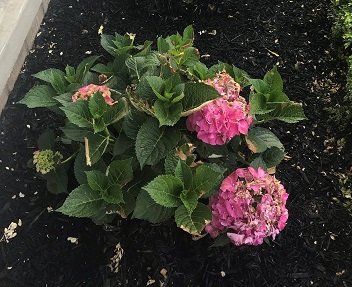Just about everyone has hydrangeas in their garden. When looking at their pale yet plentiful flowers, your last thought would be “are hydrangeas poisonous!” But, this is a thought that should cross your mind, especially if you have children, cats, or dogs in the garden.
Yes, hydrangeas are poisonous to humans, cats, dogs, and even horses. The reason is that they contain Amygdalin. This substance breaks down to cyanide when consumed and broken down by a living body.
If you want to learn more about symptoms and treatment, continue reading this blog to find out all the details you need to keep your kids, cats, or dogs safe.
14 Types Of Indoor Ivy Plants That Can Beautify Your Home
Are Hydrangeas Toxic?
Who would think that these appealing flowers happen to have a hidden secret? Are hydrangea poisonous or not is the first thought that comes to mind when you see these showy flowers.
Sad to say but, yes, hydrangeas are classified as toxic plants!
All their parts are actually toxic or poisonous. Hydrangeas are not exactly the safest plants to beautify the open areas in your garden. Hydrangeas are toxic in every way possible. These plants are not at all edible. Even contact with the skin can induce skin irritation.
Why Are Hydrangeas Poisonous?
You must be wondering how this rather innocent-looking flowering plant is poisonous. The reason is that they contain a chemical that other non-poisonous garden plants do not.
A chemical known as Amygdalin is present throughout the hydrangea plant. Amygdalin comes under the category of cyanogenic glycoside and is a compound naturally existing in a few plants.
Upon entering a living creature, the amygdalin is broken down and converted to a cyanide anion. Cyanide being a toxic compound can lead to cyanide poisoning when amounts of the chemical accumulate.
Are Hydrangeas Poisonous to Humans?
Due to the presence of Amygdalin, a cyanogenic glycoside, hydrangeas are poisonous to humans.
The hydrangea plant surprisingly gets a Category 2 and Category 3 rating for poisonous nature. This means it can be toxic depending on the degree of exposure or consumption.
Also, you cannot grow it near areas meant for children like nursery schools, parks, and recreational areas.
Symptoms of Hydrangea Poisoning
Nausea and vomiting are visible when your pet first ingests the plant. Children are at especially high risk of suffering from symptoms due to higher sensitivity to the poison of hydrangea.
The reasons being they cannot eliminate chemicals as easily as adults and that they absorb chemicals in their blood more than adults.
Touching the plants and having the amygdalin come in contact with skin can result in irritation, rashes, and even dermatitis in severe situations.
Treatment
Consulting a doctor is advisable as soon as symptoms appear. Do not delay this as it could lead to further health complications.
Treatment involves intravenous and oral fluids to flush the toxin out of the system. If the toxin is affecting the skin, it is likely to be treatable with cream and or medicines.
Is Alyssum Poisonous To Humans? What about Cats, Dogs, or Horses?
Are Hydrangeas Poisonous to Cats
Unfortunately, hydrangea is poisonous to cats and these cases could be more common in cats. The reason being their small size. These animals only need to consume a small number of hydrangea flowers or plants to fall victim to the poison!
That said, having many hydrangeas in the garden for a curious cat can be a dangerous situation. Especially if your cat is notorious for biting things in the garden often. Cats are actually known to eat grass or even plants when they are not well.
They try to eat plants in an attempt to vomit when they have eaten something they shouldn’t have and want to get rid of it through vomiting. So, you would want to make sure that your plants have other options available to them
Symptoms
The symptoms of hydrangea poisoning in cats include Diarrhea, Vomiting, Lethargy, Depression, and Confusion.
These symptoms are easier to catch if your cat is lively. But, if your cat is not as active you may have to observe closely for such signs! When you notice odd behavior, don’t dismiss it.
If your cat is spending much time outside where your hydrangeas are stationed, you would want to keep a clear eye out for these symptoms. Cats are small and only need to consume a smaller amount of hydrangea than a dog to become poisoned.
Treatment
Upon noticing odd symptoms similar to the above symptoms, a vet must be consulted.
If the cat can vomit the hydrangea contents out, the severity of the poisoning can be toned down. Severe poisoning requires immediate hospitalization followed by intravenous fluids to remove the poison from your body’s cat.
It is advisable to watch your cats carefully to make sure that these small felines make it to the vet in time!
Are Hydrangeas Poisonous to Dogs
Hydrangea poisoning in dogs is possible but not as common. This is especially true for dogs that are large. They have to consume a really high amount of hydrangea plant matter to be poisoned!
Symptoms
If your dog has been playing around with a hydrangea for a long time, it is wise to keep an eye on them. Some dogs playfully choose to chew on plants but this can come at a price when the plant is poisonous like the hydrangea.
You will notice symptoms 30 minutes after your dog has consumed a large number of hydrangeas (any part of the plant).
If it is a negligible amount, the effects may pass without you even noticing them! But if this is not the case, symptoms include:
- Diarrhea
- Vomiting
- Lethargy
- Depression
- Confusion
- Bloating
- Pain
- Lack of appetite
But, if the hydrangeas have been digested, it is very likely the toxin has already reached the bloodstream. This will require the vet to administer IV fluids, as well as draw blood and a urine test to check toxin levels.
Apart from this, there will be an x-ray and physical exam to rule out any other causes of the symptoms.
NOTE- Small dogs only need to eat a small amount of this plant to be adversely affected.
Treatment
As soon as you notice the above symptoms in your dog, you should not delay visiting a vet. Also, do not forget to take them a sample of your hydrangea to identify it and its specific poison level.
The vet will probably administer something to induce vomiting if it has not been more than 30 minutes since your dog consumed the hydrangea. This will help to remove all the plant matter and the poison or at least most of it. Treatment is based on age, health, size, and amount of toxin consumed.
Treatment for severe hydrangea poisoning requires hospitalization and IV fluids to help flush the toxins from your dog’s body. Milder cases are treatable with medication and a specialized diet plan.
When the poisoning is identified and treated as soon as possible, the prognosis is positive with the best chances of recovery.
How to Stop Pets From Being Poisoned By Hydrangea
Given the grave danger that occurs when your pet or toddler eats hydrangea plant matter, you will want to keep them far away from your hydrangeas. So, how can you accomplish this?
- Train your pet to keep away and not eat hydrangea
- Install a barrier around your hydrangea plants
- Plant pet-safe flowering plants instead of hydrangeas. Examples include: Marigolds, Roses, Petunias, Camellias, and African violets, to name a few
- Keep your hydrangeas out of reach (literally)
- You can choose to keep your hydrangea indoors if your pets are outdoor pets
Conclusion
So, if you are asking the question of “are hydrangeas poisonous” or not, the shocking answer is yes they are!
Hydrangeas are poisonous to humans (mostly children and toddlers), cats, and dogs. The severity of the poisoning is based on how much of the poison has been consumed.
When you catch hydrangea poisoning in time, the prognosis is good and recovery chances are excellent. However, if your cat or dog is small, even small amounts of hydrangea can be extremely dangerous.
Related read: Do Hummingbirds Like Hibiscus Plants?
FAQs
Are hydrangeas poisonous to horses?
Yes, hydrangeas are very poisonous to horses as they are to cats and dogs. When horses consume any part of these plants in very large amounts, it can cause severe problems. Symptoms that are a sign of high hydrangea poisoning in horses are bloody diarrhea, labored breathing, weakness, coma, and possibly even death!
Can hydrangea poisoning kill your pet?
If consumed in extremely high amounts or inability to diagnose and treat the problem fast enough, yes hydrangea can kill your pet. Hence, it is vital to keep your pet away from these plants but more importantly, catch the poisoning before it is too late for your beloved pet!
Can I treat my pet at home for hydrangea poisoning?
It is not advisable to try to treat your pet for hydrangea poisoning! If symptoms are evident, you must seek consultation and treatment from a trained vet.

